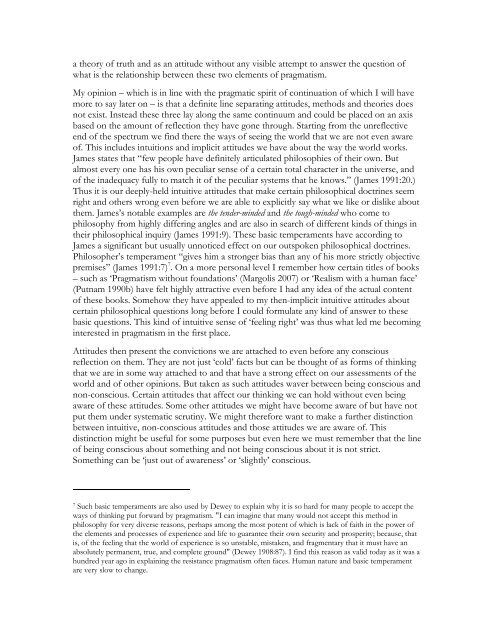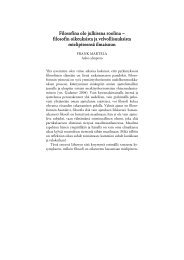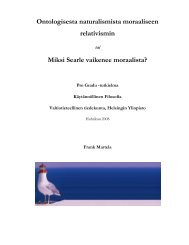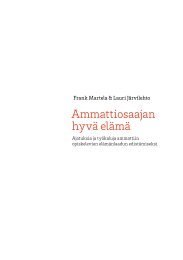Pragmatism as an attitude - Frank Martela
Pragmatism as an attitude - Frank Martela
Pragmatism as an attitude - Frank Martela
Create successful ePaper yourself
Turn your PDF publications into a flip-book with our unique Google optimized e-Paper software.
a theory of truth <strong>an</strong>d <strong>as</strong> <strong>an</strong> <strong>attitude</strong> without <strong>an</strong>y visible attempt to <strong>an</strong>swer the question of<br />
what is the relationship between these two elements of pragmatism.<br />
My opinion – which is in line with the pragmatic spirit of continuation of which I will have<br />
more to say later on – is that a definite line separating <strong>attitude</strong>s, methods <strong>an</strong>d theories does<br />
not exist. Instead these three lay along the same continuum <strong>an</strong>d could be placed on <strong>an</strong> axis<br />
b<strong>as</strong>ed on the amount of reflection they have gone through. Starting from the unreflective<br />
end of the spectrum we find there the ways of seeing the world that we are not even aware<br />
of. This includes intuitions <strong>an</strong>d implicit <strong>attitude</strong>s we have about the way the world works.<br />
James states that “few people have definitely articulated philosophies of their own. But<br />
almost every one h<strong>as</strong> his own peculiar sense of a certain total character in the universe, <strong>an</strong>d<br />
of the inadequacy fully to match it of the peculiar systems that he knows.” (James 1991:20.)<br />
Thus it is our deeply-held intuitive <strong>attitude</strong>s that make certain philosophical doctrines seem<br />
right <strong>an</strong>d others wrong even before we are able to explicitly say what we like or dislike about<br />
them. James’s notable examples are the tender-minded <strong>an</strong>d the tough-minded who come to<br />
philosophy from highly differing <strong>an</strong>gles <strong>an</strong>d are also in search of different kinds of things in<br />
their philosophical inquiry (James 1991:9). These b<strong>as</strong>ic temperaments have according to<br />
James a signific<strong>an</strong>t but usually unnoticed effect on our outspoken philosophical doctrines.<br />
Philosopher’s temperament “gives him a stronger bi<strong>as</strong> th<strong>an</strong> <strong>an</strong>y of his more strictly objective<br />
premises” (James 1991:7) 7 . On a more personal level I remember how certain titles of books<br />
– such <strong>as</strong> ‘<strong>Pragmatism</strong> without foundations’ (Margolis 2007) or ‘Realism with a hum<strong>an</strong> face’<br />
(Putnam 1990b) have felt highly attractive even before I had <strong>an</strong>y idea of the actual content<br />
of these books. Somehow they have appealed to my then-implicit intuitive <strong>attitude</strong>s about<br />
certain philosophical questions long before I could formulate <strong>an</strong>y kind of <strong>an</strong>swer to these<br />
b<strong>as</strong>ic questions. This kind of intuitive sense of ‘feeling right’ w<strong>as</strong> thus what led me becoming<br />
interested in pragmatism in the first place.<br />
Attitudes then present the convictions we are attached to even before <strong>an</strong>y conscious<br />
reflection on them. They are not just ‘cold’ facts but c<strong>an</strong> be thought of <strong>as</strong> forms of thinking<br />
that we are in some way attached to <strong>an</strong>d that have a strong effect on our <strong>as</strong>sessments of the<br />
world <strong>an</strong>d of other opinions. But taken <strong>as</strong> such <strong>attitude</strong>s waver between being conscious <strong>an</strong>d<br />
non-conscious. Certain <strong>attitude</strong>s that affect our thinking we c<strong>an</strong> hold without even being<br />
aware of these <strong>attitude</strong>s. Some other <strong>attitude</strong>s we might have become aware of but have not<br />
put them under systematic scrutiny. We might therefore w<strong>an</strong>t to make a further distinction<br />
between intuitive, non-conscious <strong>attitude</strong>s <strong>an</strong>d those <strong>attitude</strong>s we are aware of. This<br />
distinction might be useful for some purposes but even here we must remember that the line<br />
of being conscious about something <strong>an</strong>d not being conscious about it is not strict.<br />
Something c<strong>an</strong> be ‘just out of awareness’ or ‘slightly’ conscious.<br />
7 Such b<strong>as</strong>ic temperaments are also used by Dewey to explain why it is so hard for m<strong>an</strong>y people to accept the<br />
ways of thinking put forward by pragmatism. "I c<strong>an</strong> imagine that m<strong>an</strong>y would not accept this method in<br />
philosophy for very diverse re<strong>as</strong>ons, perhaps among the most potent of which is lack of faith in the power of<br />
the elements <strong>an</strong>d processes of experience <strong>an</strong>d life to guar<strong>an</strong>tee their own security <strong>an</strong>d prosperity; because, that<br />
is, of the feeling that the world of experience is so unstable, mistaken, <strong>an</strong>d fragmentary that it must have <strong>an</strong><br />
absolutely perm<strong>an</strong>ent, true, <strong>an</strong>d complete ground" (Dewey 1908:87). I find this re<strong>as</strong>on <strong>as</strong> valid today <strong>as</strong> it w<strong>as</strong> a<br />
hundred year ago in explaining the resist<strong>an</strong>ce pragmatism often faces. Hum<strong>an</strong> nature <strong>an</strong>d b<strong>as</strong>ic temperament<br />
are very slow to ch<strong>an</strong>ge.






